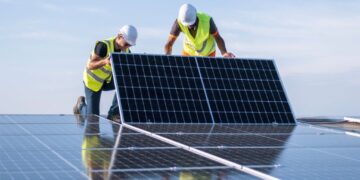Ayobami Adedinni
Christophe Begat, managing director, Anglophone West Africa, Schnieder Electric, has said the company is committed to providing safe and clean electricity from solar and wind to address the current faulty lines of energy transmission and attain full digital transmission of electricity to buildings.
Speaking at the firm’s Innovation Day 2019, he said human activities such as using generators and others were the main cause of rise in temperature globally and called for a coordinated effort by governments and power firms and other stakeholders to stem the trend.
According to him, an estimated 90 per cent of Nigerians and 2.3 billion people globally lack access to safe and reliable electricity.
In his words, ““There is an urgent need to reduce carbon emission all over the world and attain zero emission by 2030.
“60 per cent of energy globally is lost and this is good for us at Schneider as a challenge.
“About 90 per cent of Nigerians do not have access to safe, efficient electricity and this is a challenge to us to solve.
“Globally, an estimated 2.3 billion people do not have either or reliable access to electricity,’’ he said.
At the event, deliberations and interactive sessions centered on contextual applications of the latest wave of digitization in powering the digital economy to increase efficiency, business growth, and profitability.
Experts also touched on issues, including having smart buildings — which can think, sense and adapt and also control and monitor from cell phones, tackling complex IT and DC environments with cloud-based management systems, big data analytics, mobile insights and optimised operations.
Speaking, Albert Fuchet, the Cluster President for Anglophone Africa, in a keynote address entitled, “Powering and Digitizing the Economy”, said the firm would deploy digital technologies to ensure efficiency and energy security and automation.
“Digital technologies provide possibilities for a wide range of benefits ranging from efficiency gains, customer intimacy, energy security and management, automation and remote operations, safer work environment, and a lot more, depending on the user’s preference.
“Ultimately, the organisation’s bottom line is impacted in a sustainable fashion.
“The broad application of Internet of Things (IoT) is still evolving. Exploring big data and cloud computing is ongoing. Also, virtually all equipment and operations can be made smart.
“In the oil and gas sector today, we see a fully automated offshore platform. What are the ancillary services to go with such innovations that Nigerians can offer?
“It does not stop there; more and more innovations are expected. Everyone who plays in the space needs to anticipate, know what is obtainable and participate profitably,” he added.























